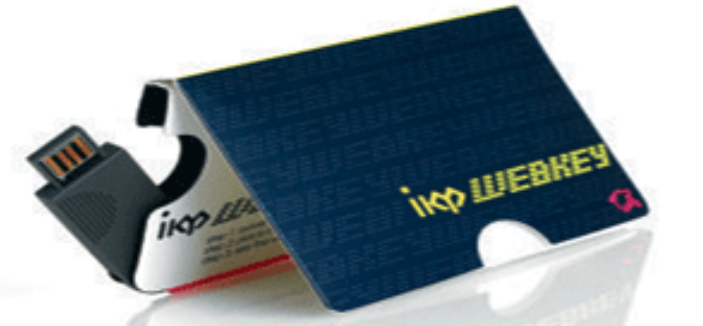Still in his early thirties, Miller has guided the company, which has 27 employees, through its first year of trading and won clients ranging from Shell and BP to Travelex and ING New York Marathon.
iKyp, an acronym for information to Keep in your pocket, is a hand-held tool with the interactive simplicity of a toy, but each one can be tailored to the marketing needs and specifications of any business or organisation.
Miller provides the example of an “iKyp” launched a few months ago in Asia for the Chinese fast-food restaurant, Café de Coral. It was handed out to commuters at Hong Kong Metro stations as a holder for electronic payment cards. Users were able earn club points when taking the holders to Café de Coral restaurants.
On the plastic holder, there are wheels and dials which can be lined-up and matched. In this instance, they showed which menu items were eligible for points, while fold-out inserts communicated the benefits of the scheme, provided sign-up instructions and included discount vouchers for Café de Coral restaurants.
According to Miller, the expected redemption rate before the launch was 3 per cent. However, during a period of 17 days, it amounted to 11 per cent.
There are a number of seasoned heavyweights involved at the fledgling company, such as property developer Godfrey Bradman who actually came up with the idea for the iKyp in 2003, and Lord Young, who is chairman and investor, plus real estate giants Reuben Brothers.
That visionary spark
Miller says: ‘We were very lucky with the people we started with as we could’ve taken the institutional route if we wanted to. What we aimed to do was to work with people who are visionary about what they do. People who can look at an untested idea and see the potential.’
If backers are not willing to bring forth ideas to move the company onwards, Miller isn’t interested: ‘We have turned round to people and said: “Thank you very much, but we don’t want you involved as we’re not going to benefit from it that much.
‘We don’t want people to just give their money and forget. We’re very lucky in that the investors we do have we speak to on a regular basis and they call up with ideas as well.’
Miller cites the classic problems for any fresh-business venture, like overcoming scepticism to something new and the struggle to build awareness and, ultimately, confidence.
He notes that obsessively testing the product and seeking ways to improve it certainly helped navigate the business through some tricky early periods.
By way of example, he admits that initially the iKyps consisted of a paper skeleton that kept on breaking. ‘They looked okay until people started playing with them,’ he says.
Miller was on a business trip in China, growing anxious that not only were they too fragile, but they were taking too long to produce: ‘I’d been saying: “We can’t actually sell this to people. It’s a great idea, but people have got to be able to use it.”’
While staying at a hotel in China, Miller says he abruptly awakened in the middle of the night, realising the design problems had been solved in a revelatory dream: ‘I called reception for a ruler and three coloured pens and a big pad of paper and I drew this thing-up and called our general counsel in London and said: “I’ve got this idea, can you try to get it registered as a design tomorrow?” The counsel said: “Fine”.
‘I went to the factory the next morning, had the new design produced within a week and overnight we managed to double production and reduce our cost by 50 per cent.’
A point to note here is the emphasis placed by Miller on getting the idea protected. In fact, from the very beginning, every idea has been registered to guard against another company infringing its patent and trademark.
He won’t name names, but he says a large utility company was discovered producing something similar to the iKyp. In the end, the company had to destroy the 500,000 copies it had produced, order 250,000 originals from Kyp Systems and pay legal fees.
Miller is clearly happy with the progress the company has made since it opened for business in September 2005. His ambition and appetite for growing the business remains insatiable.
As for where the next step will be for the company, Miller believes Kyp Systems is less about production and manufacturing and more about providing solutions, in the consulting sense, to companies that want to address communication needs and branding issues.
‘We are constantly trying to innovate with new ideas,’ he says. With a small nucleus of staff, several manufacturers in Asia, two distribution partners, a presence in 12 countries, including the US, it genuinely seems to be a case of watch this space for Miller and his team.






